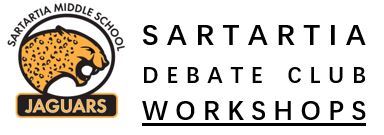Sartartia Debate Club Workshops Tournament
2019 — Sugar Land, TX/US
General Rules
Internet Access
1. Electronic evidence must be as available to the opposition team/judge as paper evidence would have been. Teams will adapt to this new trend in a variety of ways but must keep in mind that the choice to read off of a computer cannot be an excuse to withhold evidence. If a team refuses to show evidence to an opposing team/judge in a timely manner (as determined by the judge), that evidence should not be considered in the judge’s decision.
Internet access must be under the following provisions to ensure a fair round and tournament:
- Debaters cannot interact with other spectators in the round.
- Debaters cannot receive advice from a coach or adult during the round.
- Host schools do not have to provide wireless internet during the tournament.
In the event this is violated, the debater must forfeit the round.
Evidence
1. Oral Requirements: Where a quotation is ascribed to a particular individual(s), the name of the author(s), a reference to the qualifications of the author(s) (e.g., professional title or level or expertise in the subject area), and the date of the publication are required. Where the quotation is ascribed to an institutional source, (e.g., studies by research organizations, reference books, journalistic sources) the name of publication and date are adequate. Should the same source of material be quoted more than once in a round of competition, subsequent uses may be presented with abbreviated citation.
2. Written Requirements
a. Bibliographic Documentation: All participants submitting evidence in competition shall possess and present upon demand such evidence in written form. This written form must display full bibliographic source citation, even if the full citation is not orally delivered. “Full citation” includes the following elements: Author’s name, author’s qualifications, complete source information, complete date, and page number. Evidence submitted from an internet source should include the URLsite.
b. Internal Ellipses: Either no internal ellipses may be used in the written evidence form, or ellipses may be used in the written evidence form only if the original source or a copy of the original is present. The evidence may be read in the ellipsed form, but the entirety of the evidence must be available in one of the two ways cited. (Note: Ellipses are deletions after the first word of the quotation and before the final word.)
3. Abrogation of Documentation Requirements: Judges should be instructed that any evidence falling short of meeting these requirements should be afforded no legitimacy in supporting arguments.
4.Reading of Evidence by the Judge: Judges shall be strongly discouraged from examining evidence after round in the interest of expediting tournament operations and in the interest of maintaining the status of debate as an oral activity. Judges shall be instructed that evidence should not be reviewed if deficiency in the participants’ delivery (e.g., excessive speed or unclear enunciation) caused the lack of comprehension involved. Examples of proper instances of post-competition review of evidence include question of legitimacy or authenticity of the evidence and instances in which lack of comprehension lies beyond the fault of the student (e.g, external noises or mental lapses on the fault of the judge). Judges shall be instructed that should they decide that a given situation justifies overcoming the strong presumption against reviewing evidence they should be certain both that only evidence actually read in the round is reviewed and that additional elements of the sources reviewed that were no orally presented (e.g., qualifications not delivered in the speech) should be disregarded.
Evidence Misrepresentation
1. Availability of Evidence: In all debate rounds, if a team or individual debater asks to view evidence read by an opponent, the opposing team or individual is required to comply with that request at that time.
2. Responsibility for Validity: Each participant is responsible for the validity of all evidence s/he presents in rounds of competition.
3. Reasonability of Debaters Challenging Evidence Validity: Indictments or protests against the validity of evidence must be made only on substantive grounds.
a. A challenger must have either the original source or a copy of the source cited, or
b. A challenger must demonstrate that reasonable search has not been able to locate the source-such as copies of relevant pages of Books in Print, Readers’ Guide to Periodical Literature, etc.
4. Definition of Misrepresentation: Evidence is misrepresented if its origin is falsely portrayed or if it is altered so that the original intention of the author toward the issue in question is changed.
5. Penalties for Misrepresentation: Judges should be instructed that teams violating these standards shall automatically forfeit the round of competition in which the violation occurs.
Judge Conduct
When more than one judge adjudicates the same round, each judge should render their decision independently and without collusion. No judges should confer with each other before their decision is rendered and written on the ballot. It is the responsibility of the tournament director to inform each judge of this rule.

